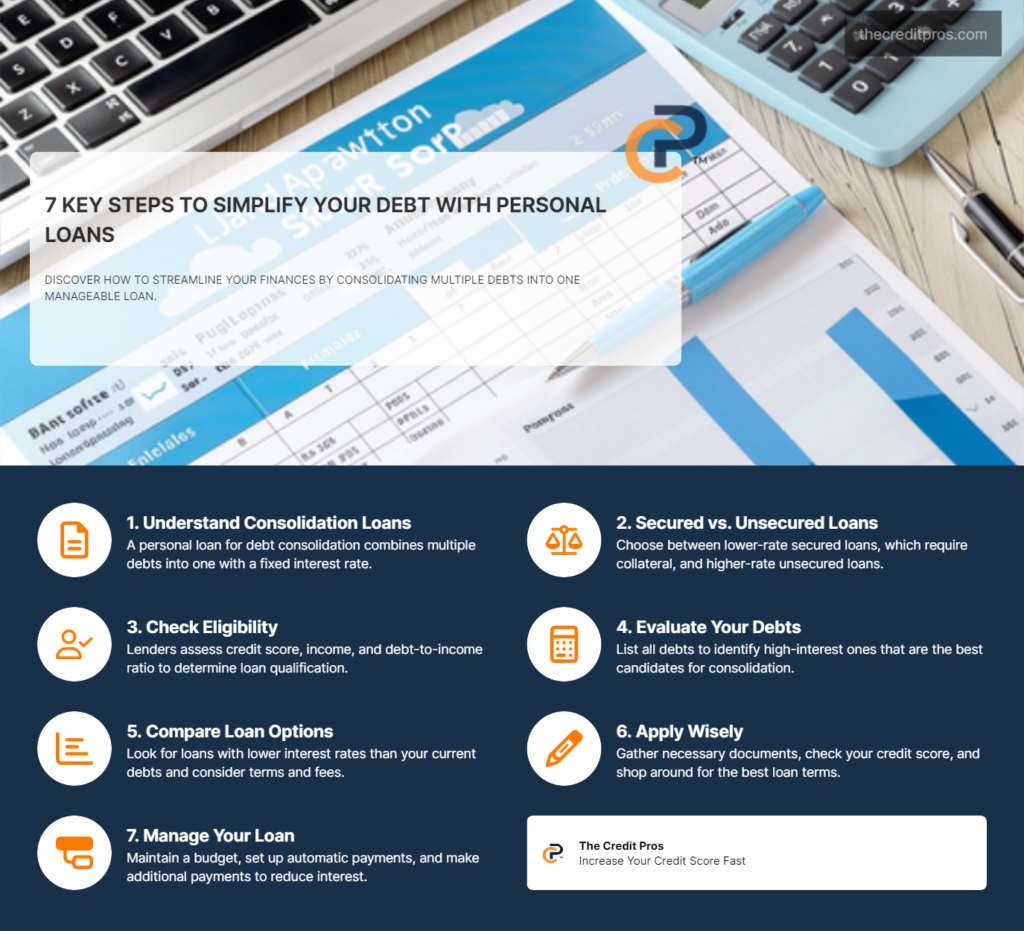Have you ever found yourself juggling multiple debt payments each month, feeling like you’re barely making a dent in the overall balances? Managing several debts simultaneously is challenging. This article explores how personal loans can be a practical tool for consolidating your debts into a single, manageable payment. But what exactly does this process involve, and how can it benefit your financial health in the long run?
Debt consolidation through personal loans isn’t a one-size-fits-all solution, and understanding the nuances can make all the difference. We’ll guide you through the types of personal loans available, help you assess your current debt situation, and provide you with the criteria to choose the right loan. By the end of this read, you’ll be equipped with the knowledge to streamline your debts effectively and pave the way toward a more stable financial future. What should you consider before applying, and how can you ensure that this strategy will work for you? Let’s find out together.
Understanding Personal Loans for Debt Consolidation
What is a Personal Loan for Debt Consolidation?
A personal loan for debt consolidation is specifically designed to simplify your financial obligations. Unlike general personal loans, these are tailored to pay off multiple debts, combining them into a single loan with a fixed interest rate and a consistent monthly payment. This approach not only helps in managing payments but also can reduce the total interest paid over time compared to high-interest credit card debts.
Types of Personal Loans Available
When considering a personal loan for debt consolidation, you have two primary options: secured and unsecured loans. Secured loans require collateral, such as a home or car, which the lender can claim if you fail to repay the loan. These typically come with lower interest rates due to the reduced risk to lenders. Unsecured loans, on the other hand, do not require collateral but often have higher interest rates. Your choice depends on your financial situation and the assets you are willing to risk.
Eligibility Criteria for Obtaining a Personal Loan
To qualify for a debt consolidation personal loan, lenders typically evaluate your credit score, income, and debt-to-income ratio. A higher credit score can help secure a lower interest rate, which is crucial for making consolidation effective. Lenders also consider stable income as an indicator of your ability to repay the loan. Understanding these criteria can help you assess your readiness to apply for a loan and possibly work towards improving your financial standing to meet these requirements.
Evaluating Your Debt Situation
Assessing Your Total Debt
Begin by listing all your current debts, including credit card debts, student loans, and any other obligations. Summing these will give you a clear picture of your total debt, which is essential in determining the feasibility of consolidation. Calculate your debt-to-income ratio by dividing your monthly debt payments by your monthly income. This ratio helps lenders assess your financial health and is a critical factor in the loan approval process.
Identifying the Right Debts to Consolidate
Not all debts are ideal for consolidation. Typically, high-interest debts such as credit card balances are the best candidates. They often benefit the most from the lower interest rates a personal loan offers. On the other hand, low-interest loans might not be worth consolidating once you factor in potential fees and the possibility of extending the repayment period. Prioritize debts with the highest rates for consolidation to maximize your savings on interest payments.

Choosing the Right Debt Consolidation Loan
Factors to Consider When Selecting a Loan
When choosing the best debt consolidation loan, consider the following key factors:
- Interest Rates: Aim for a loan that offers a lower rate than the average rate of your current debts.
- Loan Terms: Longer terms might lower monthly payments but increase the total interest paid. Find a balance that offers affordable payments without prolonging debt unnecessarily.
- Fees: Be aware of origination fees, prepayment penalties, and other charges that could offset the benefits of a lower interest rate.
Comparison of Debt Consolidation Agencies and Companies
It’s vital to compare different lenders, including banks, credit unions, and online lenders. Each can offer distinct advantages. For instance, credit unions often provide lower rates for members, while online lenders might offer more flexible terms. Evaluate each based on their reputation, customer service, and the transparency of their loan terms.
Best Practices for Loan Application
When applying for a debt consolidation loan, ensure you:
- Gather all necessary documentation, including proof of income, identification, and information on existing debts.
- Check your credit score to ensure there are no errors that could affect your loan terms.
- Shop around and compare offers from multiple lenders to find the best terms.
Managing Your Consolidated Debt
Strategies for Effective Debt Repayment
Once you secure a debt consolidation loan, it’s crucial to manage it effectively:
- Stick to a budget that prioritizes your loan payments.
- Set up automatic payments to avoid missing a payment.
- Consider additional payments whenever possible to shorten the loan term and save on interest.
Long-term Benefits of Debt Consolidation
Consolidating your debt can lead to several long-term financial benefits:
- Improved Credit Score: Consistent on-time payments can improve your credit score.
- Reduced Financial Stress: One manageable payment can reduce the stress of handling multiple debts.
- Financial Freedom: Ultimately, debt consolidation can be a step towards greater financial stability and freedom.
By understanding and utilizing these strategies, you can use personal loans not just as a tool for managing debt, but as a stepping stone towards a more secure financial future.
Conclusion: Streamlining Your Financial Path
Debt consolidation through personal loans provides a strategic approach for managing multiple debts by converting them into a single, manageable payment with potentially lower interest rates. By understanding the types of loans available, assessing your current debt situation, and carefully selecting the appropriate loan, you can significantly streamline your financial obligations. This strategy assists in reducing the total amount of interest paid and enhances your overall financial health by consolidating high-interest debts such as credit card balances.
The journey toward financial stability involves strategic financial management and making informed decisions that establish a secure financial future. Remember, the objective is to manage debt effectively. A well-planned consolidation could be your initial step toward financial freedom, positioning you to concentrate on what truly matters in your life.



